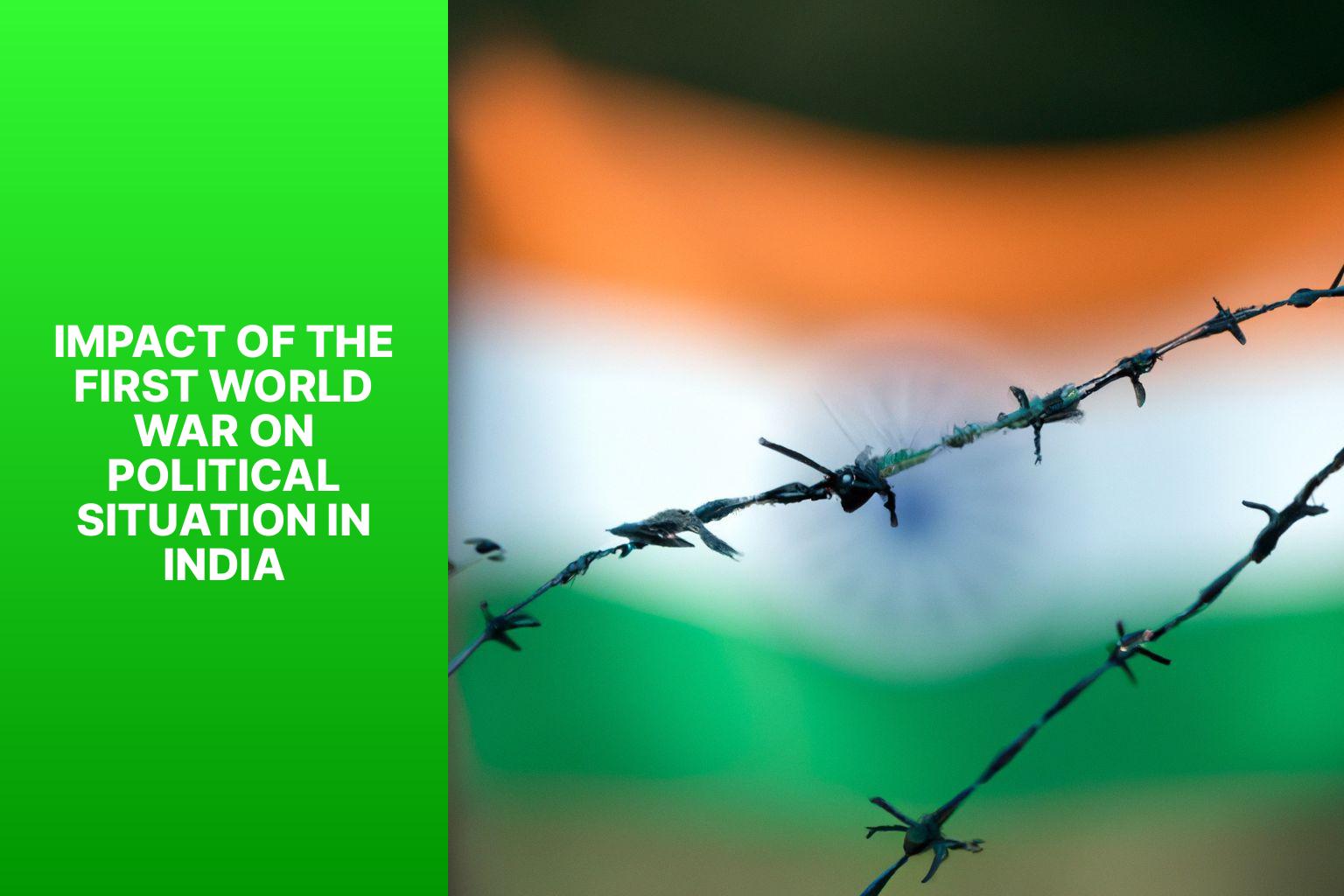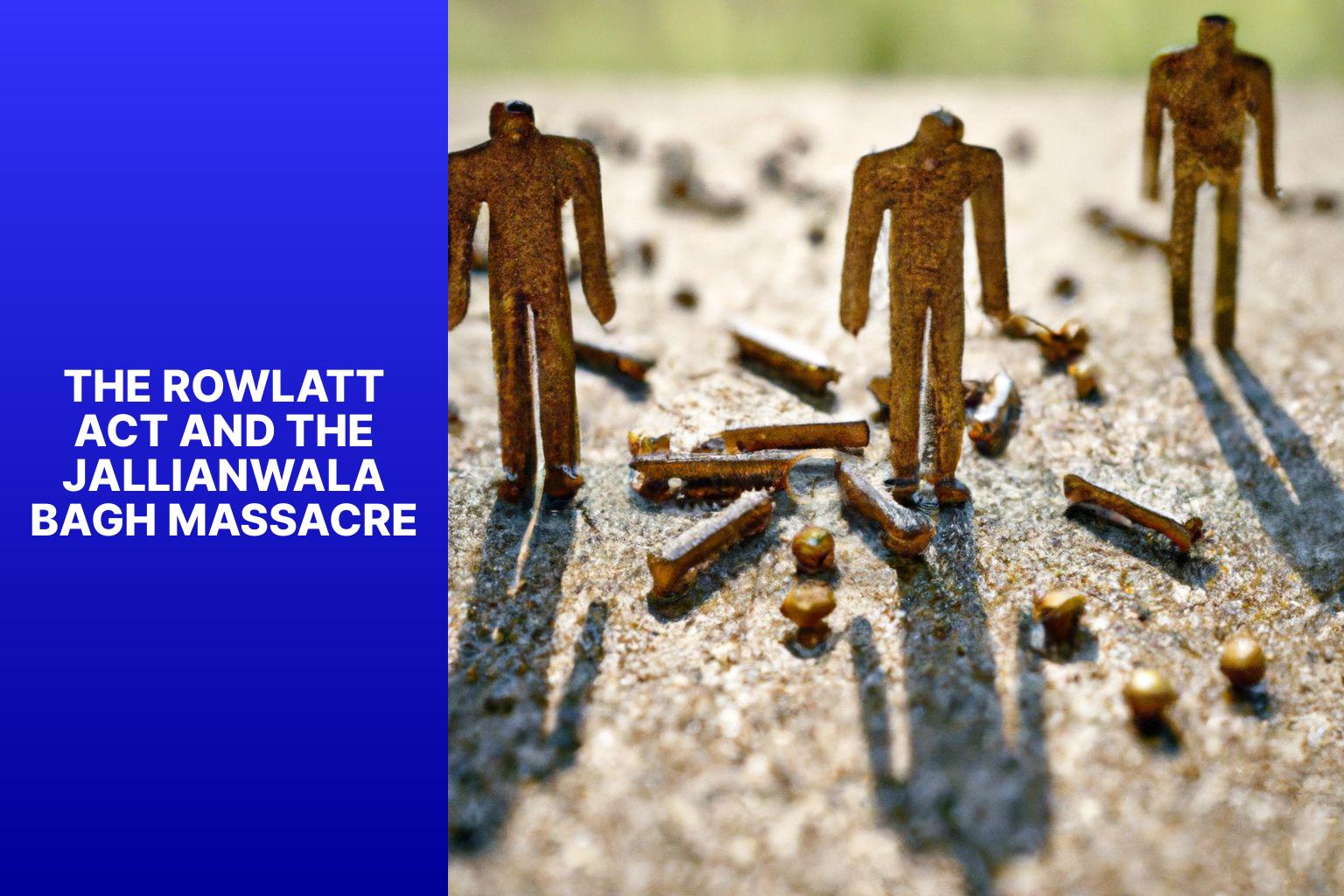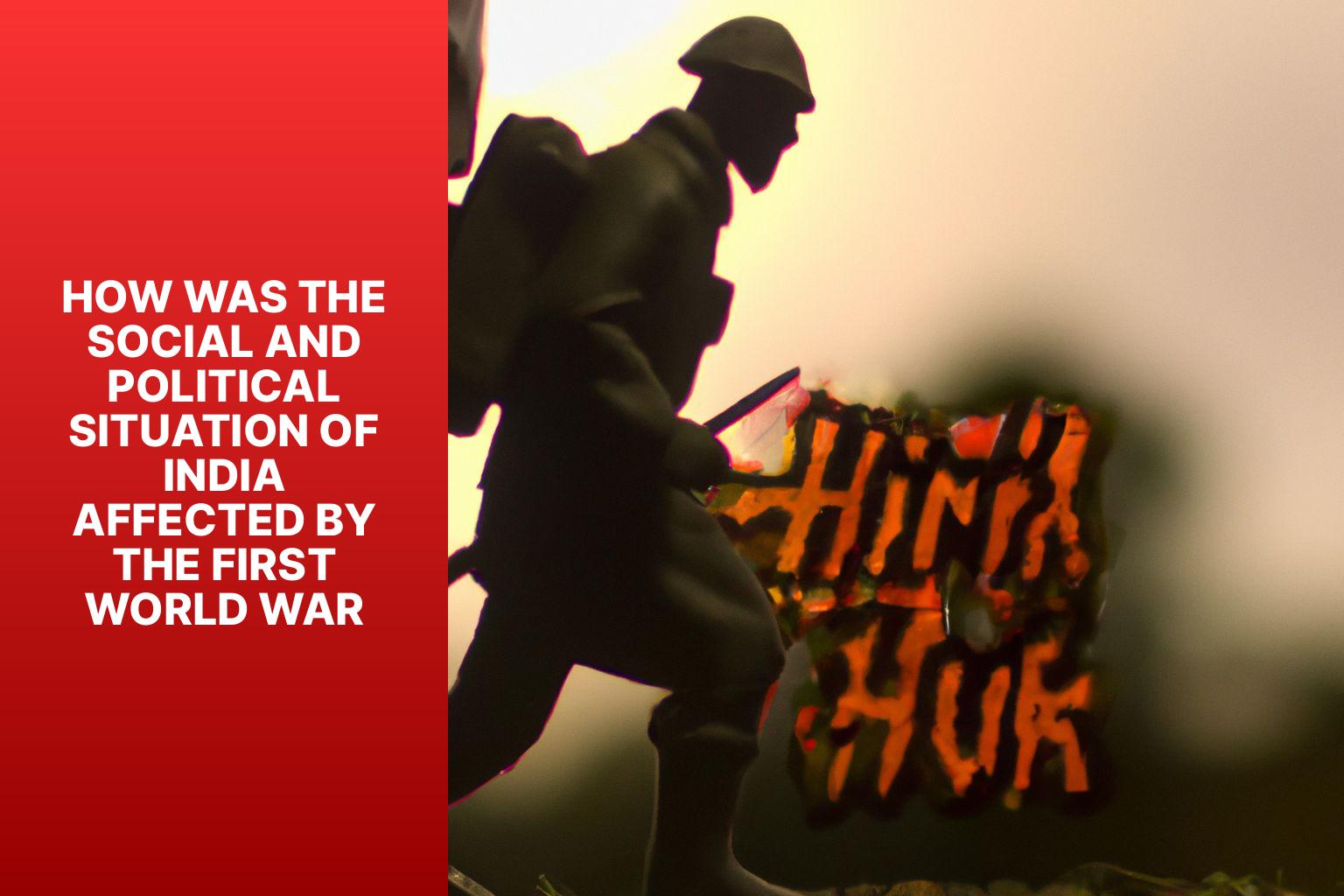The First World War had a profound impact on both the social and political situation in India. It brought about significant changes that shaped the course of India’s struggle for independence.
In terms of the social situation, the First World War led to the mobilization of Indian troops to fight in various battles across the world. This had a transformative effect on Indian society, as it encouraged a sense of nationalism and solidarity among Indians, regardless of their caste, creed, or class. The war also resulted in economic changes and industrialization in India, as the demand for goods and resources increased, leading to the growth of industries and the emergence of a new middle class.
The First World War had a profound impact on education and intellectual discourse in India. It led to the spread of ideas of democracy, freedom, and self-determination, which fueled the nationalist movement and inspired Indian intellectuals to question the colonial system.
In terms of the political situation, the First World War brought about the rise of nationalist movements in India. The sacrifices made by Indian soldiers in the war led to a surge in patriotic sentiment and a demand for self-governance. This period also witnessed the emergence of Mahatma Gandhi as a leading figure in the Indian independence movement, advocating for non-violent resistance against British rule.
The Rowlatt Act and the Jallianwala Bagh Massacre were some of the brutal consequences of the war, highlighting the repressive measures taken by the British government to quell Indian demands for freedom.
The Montagu-Chelmsford Reforms introduced in 1919 aimed to address some of these demands by proposing limited self-government in India, but it fell short of Indian expectations.
Key takeaway:
- Impact of the First World War on Social Situation in India:
- Mobilization of Indian Troops: The war led to the mobilization of large numbers of Indian soldiers, which had a significant impact on the social situation in India.
- Economic Changes and Industrialization: The war brought about economic changes and industrialization in India, transforming the social landscape of the country.
- Impact on Education and Intellectual Discourse: The war also had an impact on education and intellectual discourse in India, leading to the emergence of new ideas and perspectives.
- Impact of the First World War on Political Situation in India:
- Rise of Nationalist Movements: The war played a role in fueling nationalist movements in India, as people began to demand more political power and control over their own affairs.
- Emergence of Mahatma Gandhi: The war also contributed to the emergence of Mahatma Gandhi as a prominent leader in the Indian independence movement.
- Demand for Self-Government: The war heightened the demand for self-government and the desire for independence from British colonial rule.
- The Rowlatt Act and the Jallianwala Bagh Massacre: The Rowlatt Act and the Jallianwala Bagh Massacre were two significant events that occurred as a result of the social and political unrest during and after the war.
- Montagu-Chelmsford Reforms: The Montagu-Chelmsford Reforms, introduced in 1919, were a response to the demands for political reform and self-government in India.
Impact of the First World War on Social Situation in India
The social landscape of India underwent a significant transformation due to the impactful waves of the First World War. Delving into the aftermath of this global conflict, we explore the dramatic impact it had on the social fabric of India. From the mobilization of Indian troops to economic shifts and industrialization, as well as the profound influence on education and intellectual discourse, we unravel the intricate consequences that this war had on the social situation in India. Brace yourselves for a compelling journey through history!
Mobilization of Indian Troops
The mobilization of Indian troops during the First World War was a pivotal moment in India’s history. With over one million Indian soldiers enlisting, it ignited a sense of nationalism and pride among the Indian population, while also fostering unity. These troops displayed immense bravery and showcased their abilities in various battles.
The mobilization of Indian troops had significant economic implications. India emerged as a crucial supplier of manpower, food, and raw materials for the war effort, which consequently led to industrialization in sectors such as textiles and munitions production. This, in turn, created new employment opportunities and spurred economic growth in specific regions.
Beyond the economic and social impacts, serving in the war had a profound effect on education and intellectual discourse in India. Many soldiers returned with fresh ideas and experiences that challenged traditional norms and beliefs. Their exposure to diverse cultures and ideologies fueled a strong demand for reforms and self-determination.
The mobilization of Indian troops during the First World War left an indelible mark on India’s social, political, and economic landscape.
Economic Changes and Industrialization
The First World War had a profound impact on economic changes and industrialization in India. The war acted as a catalyst for industrial production in various sectors such as textiles, jute, and steel, as they supplied goods essential for the war effort.
To support the war and facilitate the movement of goods, there was a significant expansion in infrastructure, including railways, roads, and ports. The war stimulated the establishment of new industries, with a specific focus on defense production.
This led to job opportunities for Indians, which in turn resulted in urbanization and the expansion of cities. Agricultural practices underwent a transformation to increase food production, introducing modern techniques and cultivating new crops.
These economic changes and industrialization formed the basis for future growth in India, ultimately transforming it into a self-sufficient and industrialized nation.
Impact on Education and Intellectual Discourse
The impact of the First World War on education and intellectual discourse in India was significant. The war brought about changes in the education system, with schools and colleges being repurposed for war-related activities. This disruption affected the normal functioning of educational institutions and hindered students’ academic progress.
The war also sparked an intellectual awakening among Indian intellectuals. The sense of urgency created by the war stimulated critical thinking and led to new discussions and debates on important topics such as nationalism, imperialism, and the role of education in empowering the Indian population.
One notable influence of the war was the introduction of war literature to Indian intellectuals. Through this literature, they were exposed to European thinkers and philosophers, whose experiences and ideas shaped the intellectual discourse in India. This exposure to new perspectives and ideologies played a significant role in shaping the intellectual landscape of the country.
The war had a profound impact on nationalist thought in India. It intensified nationalist sentiment and motivated intellectuals to advocate for social and political change. Many Indian intellectuals saw the war as an opportunity to demand self-governance and resist colonial rule.
The war highlighted the need for educational reforms in India. It exposed the inadequacies of the colonial education system and emphasized the importance of promoting Indian languages, culture, and history in the curriculum. These reforms became necessary to better serve the needs of the Indian population and prepare them for a changing world.
The First World War left a lasting impact on education and intellectual discourse in India. It disrupted the education system while also fueling critical thinking, influencing new perspectives, and driving the demand for educational reforms.
Impact of the First World War on Political Situation in India

Photo Credits: Thegeopoliticalobserver.Com by Bruce Allen
As the tumultuous tides of the First World War swept across the globe, India found itself caught in the vortex of change. In this section, we will uncover the profound impact that this global conflict had on the political landscape of India. Brace yourself to witness the rise of nationalist movements, the emergence of Mahatma Gandhi as a transformative figure, and the steadfast demand for self-governance. Get ready to delve into the fascinating story of how India was shaped by the crucible of the First World War.
Rise of Nationalist Movements
The rise of nationalist movements during the First World War sparked in India. Indian nationalists viewed the war as an opportunity to demand more political rights and self-government.
The war unified Indians as they fought against British colonial rule. Indian soldiers who fought alongside British troops returned with a strong sense of national pride and a desire for independence.
The war also revealed the contradictions of British rule, as Indians were asked to fight for freedom and democracy abroad while being denied those rights at home.
Indian intellectuals and leaders like Bal Gangadhar Tilak and Bipin Chandra Pal utilized the war to mobilize the masses and advocate for self-rule.
The rise of nationalist movements during the war laid the foundation for the Indian independence movement in the future.
Emergence of Mahatma Gandhi
The emergence of Mahatma Gandhi during the First World War had a significant impact on the political and social landscape of India. Gandhi, also known as the father of the Indian Nationalist Movement, played a crucial role in India’s fight for independence.
Gandhi, through his advocacy for nonviolent civil disobedience and peaceful protests, became a prominent voice against British colonial rule. His philosophy of Satyagraha, or truth-force, inspired millions of Indians to join the freedom struggle, bringing unity and purpose to the movement.
As the leader of the nationalist movement, Gandhi helped it gain momentum and become a formidable force against British rule. His teachings and actions resonated with the Indian masses, fueling a spirit of resistance and self-determination. Gandhi’s principles of nonviolence and civil rights fueled the demand for self-government in India.
In addition to his role in the independence movement, Gandhi also championed the rights of the oppressed, including the untouchables and women. He worked tirelessly towards their upliftment and social equality. Through his teachings and actions, Gandhi fostered social harmony and unity among Indians from diverse backgrounds. The emergence of Mahatma Gandhi was a turning point in India’s history, shaping the nation’s future.
Demand for Self-Government
During the First World War, the demand for self-government in India grew. The war created unity and nationalism among the Indian population, fueling their desire for independence. Indian troops fighting alongside the British exposed themselves to democratic ideas, which further strengthened the demand for self-government.
The Indian National Congress, led by Bal Gangadhar Tilak and Annie Besant, played a crucial role in advocating for self-government. They organized mass movements and protests, demanding political representation and participation in decision-making.
Mahatma Gandhi emerged as a prominent leader during and after the war, intensifying the demand for self-government. Gandhi’s philosophy of nonviolent resistance and civil disobedience inspired the Indian masses to fight for their rights and demand self-rule.
The demand for self-government extended beyond political leaders and intellectuals; people from different backgrounds and regions of India shared the desire for self-rule. This demand reflected the aspirations of the Indian people as a whole.
The First World War exposed the flaws in colonial administration and highlighted the need for local governance, thus acting as a catalyst for the demand for self-government in India. This demand later led to the struggle for independence and the formation of the Republic of India in 1947.
The Rowlatt Act and the Jallianwala Bagh Massacre

Photo Credits: Thegeopoliticalobserver.Com by Eugene Carter
The Rowlatt Act and the Jallianwala Bagh Massacre had a significant impact on India during World War I. The Rowlatt Act, enacted in 1919, was a repressive law that aimed to suppress political dissent and curb nationalist activities. It allowed for indefinite detention without trial and limited civil liberties. This led to protests and civil disobedience, with Indians demanding the repeal of the Act.
The Jallianwala Bagh Massacre, which occurred on April 13, 1919, was a brutal incident that further fueled discontent among Indians. British troops opened fire on a peaceful gathering of thousands of Indians in Amritsar, resulting in hundreds of deaths and injuries. This act of violence deeply shocked and angered the Indian population, leading to increased demands for independence.
These events sparked widespread outrage and marked a turning point in the Indian struggle for independence. They united people from different backgrounds and ideologies in their opposition to British rule, laying the foundation for the non-cooperation movement and eventually leading to India’s independence in 1947.
Suggestions for further reading on this topic:
– “India’s Struggle for Independence” by Bipan Chandra
– “The Indian Struggle” by Subhas Chandra Bose
– “Gandhi: The True Man Behind Modern India” by Ramachandra Guha
Montagu-Chelmsford Reforms

Photo Credits: Thegeopoliticalobserver.Com by Anthony Allen
The Montagu-Chelmsford Reforms were implemented in 1919 in response to political unrest and demands for self-governance in India. These reforms aimed to give Indians more control over their country’s governance.
The British government introduced the concept of diarchy under these reforms, dividing power between British officials and Indian ministers. The central and provincial legislatures were expanded, allowing Indians to have a greater say in decision-making.
In addition, the reforms promised to protect Indians’ civil liberties and rights. They also included provisions for religious and educational reforms, fostering unity and social cohesion among diverse communities in India.
It’s important to note that the Montagu-Chelmsford Reforms fell short of Indian nationalist aspirations for complete independence. The British government still retained control over key areas like defense, finance, and foreign affairs.
Some Facts About How the Social and Political Situation of India was Affected by the First World War:
- ✅ Defense expenditure in India rose significantly during the war, leading to the need for war loans and higher taxes. (Source: Doubtnut)
- ✅ Prices in India more than doubled between 1913 and 1918, causing extreme hardship for the general public. (Source: MapsofIndia)
- ✅ Villages in India were required to provide soldiers for the war effort, which led to widespread anger due to forced recruitment in rural areas. (Source: Doubtnut)
- ✅ Crop failures in many parts of India resulted in severe food shortages during the war. (Source: MapsofIndia)
- ✅ An influenza epidemic accompanied the food shortages, causing the deaths of millions of people. (Source: MapsofIndia)
Frequently Asked Questions
How did the First World War create a new economic and political situation in India?
The First World War had a significant impact on the social and political situation of India. One of the major effects was the increase in defense expenditure, which was funded through war loans and increased taxes. This led to a rise in customs duties and the introduction of income tax to finance the war. As a result, prices in India doubled between 1913 and 1918, causing extreme hardship for the common people. Villages were required to provide soldiers for the war, leading to widespread anger due to forced recruitment in rural areas. The war also resulted in crop failures and food shortages in many parts of India. These hardships were further aggravated by an influenza epidemic, resulting in the deaths of millions of people. The First World War created a new economic and political situation in India.
How did the war affect the economic situation and the common people in India?
The increased defense expenditure and taxes imposed to finance the war had a profound impact on the economic situation of India. The rise in prices during the war years caused extreme hardship for the general public, with prices more than doubling between 1913 and 1918. This made it difficult for the common people to afford basic necessities. The introduction of income tax and the increase in customs duties placed a burden on the already struggling economy. The war also caused crop failures in many parts of India, resulting in acute food shortages. The combination of these factors created a challenging economic situation for the common people.
What was the impact of forced recruitment in rural areas during the First World War?
Forced recruitment in rural areas during the First World War caused resentment and anger among the population. Villages were required to provide soldiers for the war effort, leading to widespread outrage. The practice of forced rural recruitment disrupted the traditional social fabric of villages and resulted in considerable discontent among the rural population. This further contributed to the already volatile social and political situation in India during that time.
How did the influenza epidemic worsen the social and political situation in India during the First World War?
The influenza epidemic that accompanied the food shortages during the First World War had a devastating impact on the social and political situation of India. The epidemic resulted in the deaths of millions of people, exacerbating the already dire crisis caused by the war. The loss of lives further increased the discontent and unrest among the population, leading to a growing desire for independence from British rule.
What other factors, along with the war, influenced the social and political situation of India during that time?
In addition to the war, other factors such as the Khilafat movement and the Non-cooperation movement also influenced the social and political situation of India. The Khilafat movement, which aimed to protest against the disintegration of the Ottoman Empire and the abolition of the caliphate, gained significant support in India. This movement contributed to the growing discontent and unrest among Muslims in India. The Non-cooperation movement, led by Mahatma Gandhi, aimed to resist British rule through nonviolent means. It gained widespread support and led to boycotts of British goods, institutions, and the civil service. These events, combined with the impact of the war, created a volatile atmosphere in India, marked by widespread discontent, protests, and a growing desire for independence from British colonial rule.
How did the war lay the foundation for the Indian independence movement?
The First World War, along with other factors such as the Khilafat movement and the Non-cooperation movement, laid the foundation for the subsequent Indian independence movement. The war and its consequences created a sense of discontent and disillusionment among the Indian population. The economic hardships, loss of lives, forced recruitment, and political unrest fueled a desire for independence from British rule. The events during this period served as catalysts for the Indian independence movement and ultimately led to the end of British colonial rule in India.

[…] Indian National Congress played an crucial role in the nation’s freedom in 1947. Jawaharlal Nehru, who was the first […]